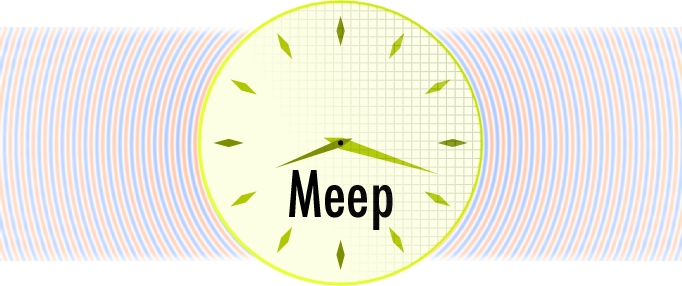Meep is a free and open-source software package for electromagnetics simulation via the finite-difference time-domain (FDTD) method.
- Free and open-source software under the GNU GPL.
- Complete scriptability via Python, Scheme, or C++ APIs.
- Simulation in 1d, 2d, 3d, and cylindrical coordinates.
- Distributed memory parallelism on any system supporting MPI.
- Portable to any Unix-like operating system such as Linux, macOS, and FreeBSD.
- Precompiled binary packages of official releases and nightly builds via Conda.
- Arbitrary anisotropic electric permittivity ε and magnetic permeability μ, along with dispersive ε(ω) and μ(ω) including loss/gain, nonlinear (Kerr & Pockels) dielectric and magnetic materials, electric/magnetic conductivities σ, and saturable gain/absorption.
- Perfectly-matched layer (PML) absorbing boundaries as well as Bloch-periodic and perfect-conductor boundary conditions.
- Exploitation of symmetries to reduce the computation size, including even/odd mirror planes and 90°/180° rotations.
- Arbitrary current sources including a guided-mode launcher.
- Frequency-domain solver for finding the response to a continuous-wave (CW) source.
- ε/μ and field import/export in the HDF5 data format.
- GDSII file import for planar geometries.
- Materials library containing predefined broadband, complex refractive indices.
- Field analyses including Poynting flux, mode decomposition, near to far transformations, frequency extraction, local density of states (LDOS), modal volume, Maxwell stress tensor, arbitrary functions; completely programmable.
We kindly request that you cite the following paper in any published work for which you used Meep:
- A.F. Oskooi, D. Roundy, M. Ibanescu, P. Bermel, J.D. Joannopoulos, and S.G. Johnson, MEEP: A flexible free-software package for electromagnetic simulations by the FDTD method, Computer Physics Communications, Vol. 181, pp. 687-702, 2010 (pdf).
See the manual on readthedocs for the latest documentation.

